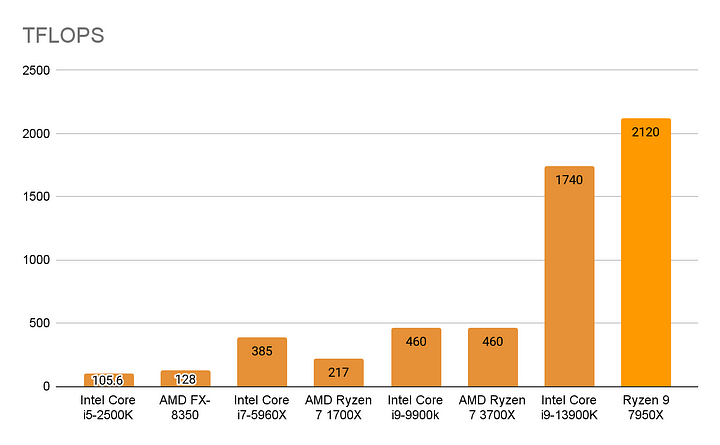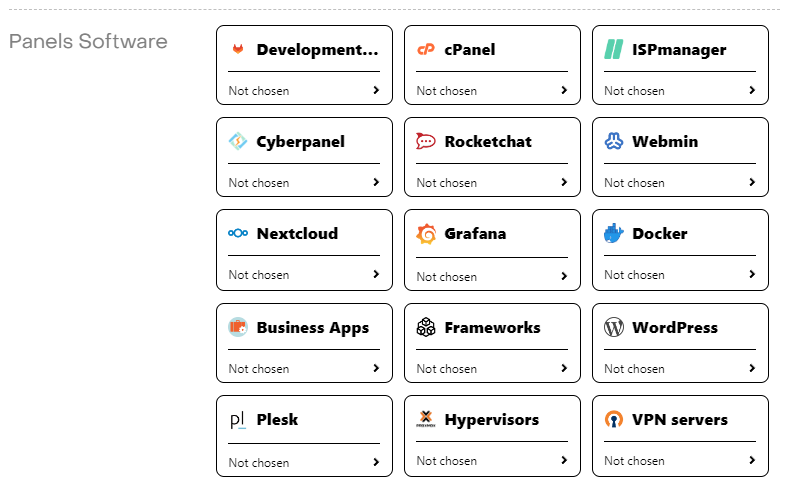Introduction
The hosting industry is one of the most important and in-demand branches in the modern IT market. The number of sites and applications that require high-quality and reliable hosting increases every year, and along with that, so does the competition among providers. In this article, we'll look at the main trends awaiting the industry in the near future.
Increased speed and performance
As technology advances and user demands for speed and performance increase, ISPs will continue to work to improve the speed and performance of their services.
As an example, let's take a look at the changes in processor performance in recent years:

Increased hardware performance enables the deployment of more powerful and efficient servers, allowing you to implement new security features, increase data storage capacity, and reduce customer support and hardware maintenance costs.
More cloud solutions and services

Cloud solutions allow companies to significantly reduce IT infrastructure costs, accelerate the deployment of applications and services, and provide the ability to scale resources depending on changing business needs.
The popularity of cloud solutions is already having a significant impact on the hosting industry: the move to a software subscription model, the shortening of the software upgrade cycle, the appearance of new innovative products - these are just some of the industry changes caused by the development of cloud solutions.
Most hosting companies are seeking to provide access to various cloud solutions for their customers, which leads to the need to hire new IT specialists, and also promotes competition among hosting companies.

Developments in security technology
Security is one of the top priorities for hosting clients. Providers strive to implement new technologies to protect against cyberattacks and other threats, from DDoS attacks to server hacks and theft of customer personal data.
To improve the security of their services, hosts use a variety of technologies, such as:
- Data encryption: data transmitted between clients and servers can be encrypted using SSL certificates or other encryption methods to prevent it from being intercepted and accessed by intruders.
- Multi-factor authentication: a functionality that requires the user to authenticate in multiple forms to access the account, such as a password and an SMS code. This reduces the risk of unauthorized access to the account even if the password is compromised.
- Firewall and antivirus software: hosters can use software that can detect and block hacking or other attempts at cyberattack in real time.
- Monitoring and logging systems: continuously monitor servers for threats and record all events related to server security.
- Data backup: this is an important aspect of security, allowing you to recover data in the event of even total server failure.
Improvements in hosting security technology are driving the development of advanced and effective methods to protect against cyber threats. Increased security requirements may lead to higher hosting costs and fewer players on the market.
Introducing artificial intelligence and automation
Hosting companies use artificial intelligence in various aspects of their operations. Here are some specific examples of how host companies employ artificial intelligence:
- Machine Learning Security: AI is used to identify malware and suspicious activity in incoming web traffic. For example, the platform Monarx uses AI to detect malware and unusual traffic patterns, which helps prevent cyberattacks on websites.
- Protection against bots and DDoS attacks: by analyzing the behavior of online activity, the AI is able to distinguish between human and bot and block unwanted visitors.
- Traffic routing optimization: AI analyzes web traffic patterns and selects optimal content delivery paths, which helps speed up web page loading.
- Infrastructure management: AI is used to monitor and manage your hosting infrastructure, preventing performance problems and reducing downtime. The AI can automatically detect and diagnose problems, warn of potential failures, and optimize resource usage.
- Predicting resource consumption: the use of machine learning can predict required server resources based on data about traffic, user sessions and other factors. This allows customers to choose the right server size and avoid resource shortages during peak activity, such as sales or promotions.
- Predicting performance problems: AI is used to analyze traffic and resource usage data to predict potential performance problems before they occur. This helps host companies prevent disruptions and improve website performance by quickly identifying and fixing potential problems.
Increased use of microservices architecture
Microservices architecture is becoming more and more popular, and this is reflected in the hosting industry. Providers are offering more and more microservice and container management solutions.
A microservice architecture allows for more efficient use of server resources. Services can run and scale independently of each other, allowing for better management of server workloads. This is especially important for hosting providers who provide services to multiple customers.
Microservice architecture simplifies integration with other systems and services. Different services can communicate with each other via an API protocol, which makes it possible to create complex and flexible applications.
The increased use of microservices architecture in hosting can lead to a number of changes in the industry, Such as a reduction in the number of monolithic applications used on hosting providers' servers. This could lead to changes in the technology stack and employee requirements.
An increase in the number of microservices may require more resources to manage, monitor and secure them. New services and tools for working with microservices may also appear.
Conclusions
Greater competition among hosters encourages companies to continuously improve their services. In the coming years, server hardware performance will continue to advance, which will allow hosters to offer more cloud solutions and services to customers.
The development of artificial intelligence technologies depends on many factors and can bring both significant breakthroughs and unexpected challenges, including for hosting companies. The application of these technologies is already having an impact on the development of hosting, both in the context of the application of AI in workflows within companies, and in the growth in demand for GPU servers. Further development of artificial intelligence technologies will provide new opportunities to optimize the work of hosting companies and contribute to the demand for the services of these companies.
The growth of hardware performance and the development of new technologies, including AI, contribute to the development of tools to protect against cyber threats. Even now, large hosters offer various options for protecting customer data: multi factor authentication, monitoring and logging systems, anti-virus software, and data encryption.
The growing use of microservice architectures in the future will have a significant impact on the work of hosters. Instead of traditional monolithic applications, they will be faced with managing and supporting distributed systems consisting of many independent services. This will require a more sophisticated infrastructure capable of providing high resiliency, flexibility and scalability to deploy, manage and monitor each service separately. In addition, hosters will need to provide automation tools to facilitate the deployment, scaling and updating of microservices.


